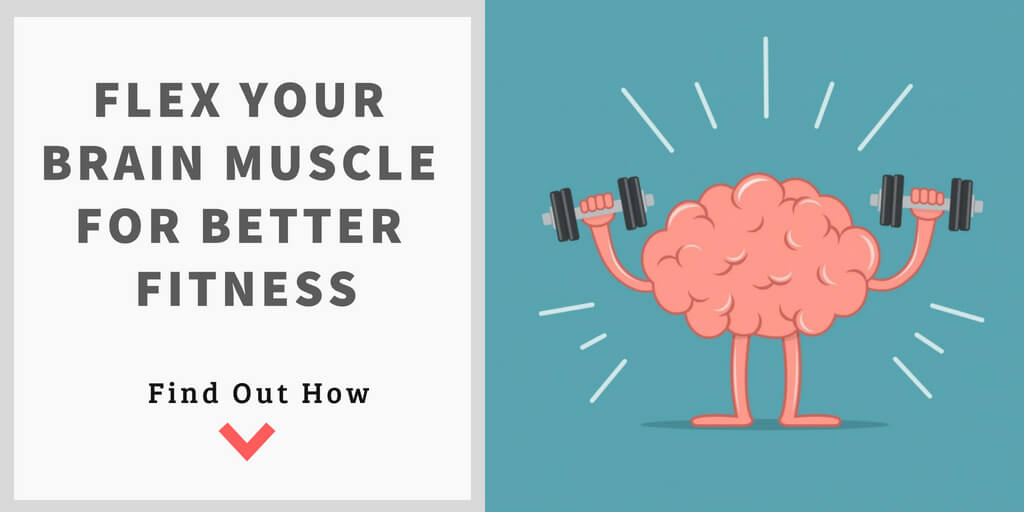Does your workout quality depend on how your day is going?
Do you feel like you have to drag yourself to the gym in the morning?
Looks like you need a mindfulness pick-me-up.
Mindfulness is a way to strengthen your mind so you can focus better, feel less stressed and anxious, and get your body to its optimal level of energy. Other benefits of mindfulness include:
- Appreciating the small stuff in life and being grateful in the moment.
- Learning to control your attention to things or regulate your focus.
- Self-awareness, self-compassion, and body awareness.
From the minute your alarm goes off, your brain starts thinking…about everything and anything it can. It can be hard to redirect your thoughts.
This can be exhausting.
Mindfulness can help teach you how to overcome so many distractions and stay as centered as possible. Staying focused and calm can help you make healthier decisions in your eating, exercise, and otherwise.
Can mindfulness help fitness? Of course.

Think about it this way. If you are feeling stressed, your breathing becomes shallow, which means that your body is not getting all the oxygen it could be getting. If you are not getting enough oxygen, do you think you’re going to be able to give it your best at the gym?
Probably not.
 Research states that those who practiced mindfulness had improved breathing rate and depth, lower heart rate after exertion, and in turn had improved recovery.
Research states that those who practiced mindfulness had improved breathing rate and depth, lower heart rate after exertion, and in turn had improved recovery.
In fact, a study of eight Marine infantry platoons found that those who practiced mindfulness daily for eight weeks had enhanced exercise recovery compared to those who followed a just-as-usual routine. Mindfulness-Based Fitness Training (MMFT) helped produce greater reactivity as well as lower heart rate and breathing rate after stressful training than those in the non-MMFT group.
Are you convinced yet?
 If not, then consider that mindfulness training can also help improve mental health. Those with anxiety and depression can reduce distracting thoughts and improve overall well-being with mindfulness. If this an issue for you, then mindfulness can help improve your productivity inside and outside of the gym.
If not, then consider that mindfulness training can also help improve mental health. Those with anxiety and depression can reduce distracting thoughts and improve overall well-being with mindfulness. If this an issue for you, then mindfulness can help improve your productivity inside and outside of the gym.
In fact, a study found that a combination of aerobic exercise and mindfulness training helped reduce depression symptoms in those with major depressive disorder. With depression continuing to be a public health issue, this type of finding shows some great promise. So, what does mental health have to do with my fitness?
More than you think.
Mindfulness not only helps improve your fitness recovery, but can also recover your state of mind, which as you know is crucial to success in your fitness routine. If your head is not in the game, then you will likely veer off track and not follow through with your health routine.
So, how do I get started?
 Becoming more mindful is not an overnight thing. Like anything in your health routine, it takes study, practice, and consistency. Here are a few steps to get started.
Becoming more mindful is not an overnight thing. Like anything in your health routine, it takes study, practice, and consistency. Here are a few steps to get started.
- Download a mindfulness app to your phone
- Take a yoga class
- Enroll in a mindfulness training class online
Bottom line is that although diet and exercise is an important part of staying fit, you can’t forget that your brain is the control center of your entire body. And if you don’t take care of your brain, then the health of your whole body may suffer.
References:
1. Corliss, J. (January 8, 2014) “Mindfulness meditation may ease anxiety, mental stress.” Harvard Health Publishing: Harvard Medical School.
2. Henriques, Ph.D., G. (February 6, 2015) “What Is Mindfulness and How Does It Work?” Psychology Today.
3. Niemiec, Psy.D., R.M. (November 1, 2017) “3 Definitions of Mindfulness That Might Surprise You.” Psychology Today.
4. Kennedy, LMT, MA, DrPH(c), A.B. and Resnick, LMT, ATC, MA, P.B. (2015) “Mindfulness and Physical Activity.” American Journal of Lifestyle Medicine, 9(3), http://journals.sagepub.com/doi/abs/10.1177/1559827614564546
5. DeMarzo, M.M.P., et al. (March 25, 2014) “Mindfulness may both moderate and mediate the effect of physical fitness on cardiovascular responses to stress: a speculative hypothesis.” Frontiers in Physiology, https://doi.org/10.3389/fphys.2014.00105
6. Johnson, D.C., et al. (August 2014) “Modifying resilience mechanisms in at-risk individuals: a controlled study of mindfulness training in Marines preparing for deployment.” American Journal of Psychiatry, 171(8): 803-806.
7. Alderman, B.L., Olson, R.L., Brush, C.J., and Shors, T.J. (2016) “MAP training: combining meditation and aerobic exercise reduces depression and rumination while enhancing synchronized brain activity.” Translational Psychiatry, 6: e726.

